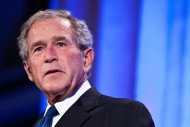Amnesty International on Thursday urged Ethiopia, Tanzania and Zambia to arrest former US president George W. Bush for violating international torture laws, during his African tour this week.
Bush is touring the countries through to Monday to promote efforts to fight cervical and breast cancers, and Amnesty said the three nations have an obligation to arrest him under international law.
“All countries to which George W. Bush travels have an obligation to bring him to justice for his role in torture,” said Amnesty’s senior legal adviser Matt Pollard.
“International law requires that there be no safe haven for those responsible for torture; Ethiopia, Tanzania and Zambia must seize this opportunity to fulfil their obligations and end the impunity George W. Bush has so far enjoyed.”
“Amnesty International recognizes the value of raising awareness about cervical and breast cancer in Africa, the stated aim of the visit, but this cannot lessen the damage to the fight against torture caused by allowing someone who has admitted to authorising water-boarding to travel without facing the consequences prescribed by law,” the group said in a statement.
Amnesty made a similar appeal to Canada in October when Bush visited British Columbia for an economic summit.
The group claimed Bush authorised the use of “enhanced interrogation techniques” and “waterboarding” on detainees held in secret by the Central Intelligence Agency between 2002 and 2009.
Amnesty’s case relies on the public record, US documents obtained through access to information requests, Bush’s own memoir and a Red Cross report critical of the US’s war on terror policies.
Amnesty cites several instances of alleged torture of detainees at the Guantanamo Bay, Cuba, naval facility, in Afghanistan and in Iraq, by the US military.
The cases include that of Zayn al Abidin Muhammed Husayn (known as Abu Zubaydah) and 9/11 mastermind Khalid Sheikh Mohammed, both arrested in Pakistan. The two men were waterboarded a total of 266 times from 2002 to 2003, according to the CIA inspector general, cited by Amnesty.
